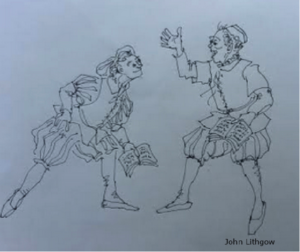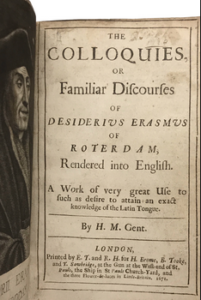Book Project
Overview of my book: Lessons from Shakespeare’s Classroom: Empowering Learning Through Drama and Rhetoric

Performing Colloquies
My book explores the relationship between the emphasis on performance in Elizabethan humanist education and the flourishing of literary brilliance around the turn of the sixteenth century. It also credits this same education with the nurturing of the most enthusiastic, critical, knowledgeable, and sophisticated theatre audience the English-speaking world has ever known.
I believe that we need more performing arts, storytelling and creative language in our schools. A great deal more. Every day. This is not because we need more actors, dancers, musicians and writers but because we need smarter, more thoughtful citizens. We need nimble thinkers with the mental flexibility to process the daily onslaught of information provided to us in the age of the Internet. We need a population of adults for whom creative and critical thinking comes instinctively. We need to take a hard look at the history of the role of the performing arts in learning and recognize how far afield we have strayed from the core purpose of education and how totally out of step we are with the past (and, indeed, with much of the rest of the world) in our current, hyper-focus on accountability in literacy and numeracy, with its data-based and testing-obsessed educational environment.
The young Will Shakespeare’s generation went to schools where they were taught to engage in the reading, writing, and dramatic voicing of the rhetorical flourishes of Terence, Virgil, Cicero, Horace, and Ovid. They also learned conversational Latin through role-playing in colorful colloquies—short, scripted playlets. They engaged daily in both formal and informal performance, developing the presentational skills of an actor; and, as a result, they grew up to be the most discerning audience in theatre history and to write the works that became the foundation of our literary heritage.

Colloquies
The cornerstone of this heritage was the humanist curriculum that was envisioned by Desiderius Erasmus, the most famous intellect of Northern Europe early in the 16th century. It enjoyed a brief span in the history of education, reaching its height of implementation during the time that Shakespeare went to the Latin grammar school in Stratford. This book is an historical examination of the intersection between arts education and learning. It focuses on the way Shakespeare and his peers were educated using physical rhetoric, or actio, in the recitation of classical literature and regularly performing colloquies to practice Latin conversation. It will examine connections relevant to the education offered in schools today.